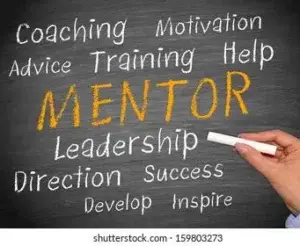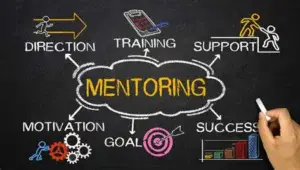Business mentorship is all about sharing wisdom, experience, and insights with someone who’s a few steps back in their career journey. Think of it like having a personal guide in the professional maze. The idea is not to spoon-feed answers but to empower and equip the mentee to tackle challenges on their own.

A good mentorship can open doors to incredible career growth. Imagine having someone who’s been through the wringer in your corner, offering advice that took years to learn. Mentorship is that cheat code to accelerate your learning. Many successful folks attribute their rise in their fields to the solid support of their mentors.
There’s a bunch of myths floating around about business mentorship that need busting! First off, mentorship isn’t about finding someone to do your work for you. It’s not a one-sided relationship either, where only the mentee benefits. A healthy mentoring relationship thrives on mutual respect and learning. Both parties can gain so much, be it fresh perspectives for the mentor or seasoned advice for the mentee.
Why Mentorship Matters: Real Stories and Data
Mentorship isn’t just a buzzword—it’s a career-shaping game-changer with real stories and stats to back it up. In the world of business, some of the biggest names credit their rise to having a mentor by their side. Take Oprah Winfrey and her mentor Maya Angelou or Steve Jobs mentoring Mark Zuckerberg to illustrate how transformative these relationships can be.
Statistically speaking, the numbers don’t lie. Organizations that nurture mentor-mentee programs report higher employee satisfaction and career success rates. According to a study by the American Society for Training and Development, employees who participate in mentoring are five times more likely to get promoted than those who don’t.

Case studies really highlight mentorship’s power. For example, when Sheryl Sandberg was navigating her career, she leaned on guidance from mentors like Eric Schmidt of Google. These relationships provided her with actionable insights and a broader view, showcasing how essential mentorship can be in providing direction and support.
Having someone who’s already walked the road share their journey isn’t just inspiring; it’s practical. These stories of success and the data supporting mentorship offer a compelling argument to get involved, whether you’re seeking guidance or ready to share your knowledge.
Finding Your Ideal Business Mentor
So, you’re on the lookout for a business mentor—someone to help you navigate the twists and turns of your career journey. But with so many charismatic professionals out there, how do you zero in on the right one?
First things first, a great mentor needs to have a blend of experience, empathy, and a genuine interest in seeing you succeed. They’ve been around the block and learned a thing or two, and importantly, they’re willing to share their insights and listen to your challenges without judgment.
Look around in your existing network for potential mentors. That colleague who’s always nailing presentations? Or that manager whose leadership style you admire? Identifying role models you already know can simplify the hunt. Often, the best mentor is someone who’s seen you in action and can offer personalized guidance.

If your immediate circle doesn’t offer suitable options, no sweat. Online platforms like LinkedIn can be goldmines for finding mentors. Professional organizations and industry events are perfect for meeting seasoned pros willing to share their wisdom. Networking, both online and offline, opens doors to experts you might never find otherwise.
Remember, the right mentor is someone who not only has the professional chops but also vibes with you personally. It’s about building a relationship that feels natural, where both of you are excited to engage and learn from each other. Trust your gut feelings when choosing, and you’ll find your perfect guide to success.
Approaching a Potential Mentor the Right Way
Making the first move to approach a potential mentor can feel a bit like asking someone out for the first time—nerve-wracking but totally worth it. Your approach should be genuine and show that you’ve done your homework.
Start with a clear and compelling request. Share what motivates you and why you think a mentorship relationship with them would be valuable. Be specific about what you hope to learn and how they inspire you. Keep it personalized and sincere; nobody wants a generic mass email!
Don’t just hit send on a request without some solid research. Understand their work, their career highlights, and maybe even some shared connections you can mention. A well-informed message shows respect and sets the tone for a respectful relationship.
It’s not all about what you can get, but what value you can add. Maybe you have a fresh perspective on a project they’re working on, or you’ve got skills in a tech area they’re less familiar with. Mentorship is a two-way street, so a little give and take goes a long way.
Strike up a conversation first if the idea of a formal request feels daunting. Engage with their content online, attend events where they’re speaking, or ask mutual contacts for an introduction. This way, when you do make your ask, you’re not a complete stranger.
By approaching your potential mentor thoughtfully and respectfully, you set the stage for a powerful partnership that benefits both sides. Good vibes, good intent, and genuine interest will take you a long way toward finding that perfect mentorship connection.
Developing a Successful Mentorship Relationship
Getting a mentorship relationship off to a strong start involves setting clear expectations from both sides. Discuss what each party hopes to achieve and how often you’ll connect. The best mentor-mentee pairs establish goals that challenge but don’t overwhelm.
Schedule regular check-ins that fit both your lives. Be flexible, but also respectful of each other’s time. A consistent rhythm keeps both sides accountable and the relationship fruitful.
Communication is everything. A good mentorship hinges on openness and honesty, allowing for constructive feedback that helps everyone grow. Whether in-person or virtual, create a safe space where both can share ideas and challenges candidly.
Remember that a mentorship is a two-way street. It’s not just about soaking up wisdom like a sponge. Come prepared to share your updates, insights, or even offer help where your skills might complement your mentor’s expertise.
Adapt and evolve as your mentorship progresses. What you needed at the start might shift as you grow. Be open to renegotiating goals and the structure of your sessions. This flexibility ensures that your partnership remains relevant and productive.
Building a lasting and effective mentorship relationship takes time and effort. But when both parties are committed and engaged, the benefits are well worth it, offering personal and professional growth that can last a lifetime.
Being an Effective Business Mentor
Being a mentor isn’t just about imparting wisdom—it’s about truly understanding your mentee’s aspirations and objectives. Take the time to really listen to their goals and any obstacles they might face. This understanding forms the foundation of a meaningful mentorship relationship.
Communication is key. Check in with your mentee regularly, offering guidance that is direct but supportive. Constructive feedback is a powerful tool; it builds confidence and encourages self-improvement. It’s about striking the right balance between guiding and letting them find their own solutions.
As a mentor, your job is to boost independence, not create dependence. Share your insights and advice, but also encourage them to think critically and develop their own solutions. Support them as they become more confident and self-reliant.
Mentorship isn’t just about professional development, it’s also about fostering a connection. Share a bit about your own journey, including the challenges you’ve faced. This sharing can build trust and strengthen your relationship.

Be open to learning from your mentee as well. Mentorship is not a one-way street—it’s a chance for you to grow, too. Whether it’s understanding new technologies or gaining a fresh perspective, embrace the opportunity to learn something new.
Being an effective mentor can have a ripple effect, impacting not just the mentee but your own personal and professional growth. It reinforces your leadership skills and keeps you connected to emerging trends and new ideas.
Overcoming Challenges in Mentor-Mentee Relationships
Mentor-mentee relationships aren’t always smooth sailing. One common hiccup is misalignment in expectations. To dodge this, establish and revisit your goals regularly. Be upfront about what each of you hopes to gain, and tweak them as needed.
Time can be another tricky opponent. Both mentors and mentees juggle various commitments, and finding common time can be tough. Prioritize your meetings and practice flexibility to ensure both parties stay engaged.
Another roadblock is communication issues. It’s not always easy to say, ‘I didn’t quite get that’ or ‘I disagree.’ Create a space where honesty is encouraged and miscommunications are quickly cleared. Remember, clarity is key to keeping things on the right track.
Boundaries matter too. Define clear lines to maintain professionalism. Whether it’s about respecting time, maintaining confidentiality, or staying on topic, knowing where to draw the line helps maintain a respectful relationship.
When challenges arise, consider them opportunities. Discussing issues openly can strengthen your partnership and enhance mutual understanding. By tackling these challenges head-on, you’ll both benefit from a more resilient and rewarding mentorship relationship.
Before we rapped this article you can also visit the following pages for more existing opportunities.
Constant flow of email’s chooses: WEBER
https://intimebiztraining.com/review-for-aweber-email-marketing-campaign/
Your own online business : Wealthy Affliliate
www.wealthyaffiliate.com?a_aid=6eebc8f8
Check out your manhood: Mentality
https://mantalityhealth.com/?aff=cedricwilliams1958
All your projector needs
https://intimebiztraining.com/enhancing-traini…ctor-integration/
All your training needs: Intime Biz Training
All your computer needs
https://intimebiztraining.com/digital-transfor…iness-operations/
All your video recording equipment
https://intimebiztraining.com/maximizing-train…-and-scalability/
Building a Culture of Mentorship in Your Organization
Creating a mentorship-friendly environment in your organization starts from the top. When leaders champion the idea, it sets the stage for a culture where mentorship thrives. Encourage company leaders to share their own mentorship stories and experiences as a way to highlight its value.
Employees are more likely to participate when mentorship is woven into the organizational fabric. Include mentoring programs as part of your onboarding process so new hires feel supported from day one. A formalized approach ensures mentorship isn’t just left to chance.

Organizations can benefit from fostering peer mentorship, where employees across similar levels guide each other. This builds camaraderie and boosts collective knowledge. Sharing is caring, and when knowledge circulates, everyone wins.
Technology can be a handy tool in breaking down barriers. Use platforms that facilitate easy communication and pairing between potential mentors and mentees. Virtual sessions can connect members across different locations, diversifying and enriching the exchange of ideas.
Celebrate mentorship successes to reinforce its importance. Highlight successful mentor-mentee pairs and share their stories in company meetings or newsletters. Recognition not only rewards but also motivates others to join the mentorship bandwagon.
By embedding mentorship into the very DNA of your organization, you create an environment ripe for personal and professional growth. Employees feel valued and empowered, which boosts morale and cultivates a culture of continuous learning and improvement.
